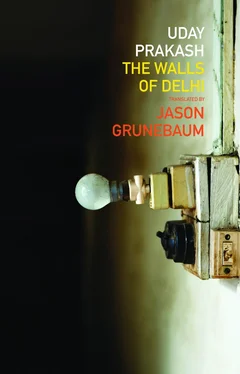A bit later Shobha was taken aback when she again put her hand on the forehead of Suryakant, still engrossed in nursing.
‘Chandu… Chandu!’ she called, her expression fixed between smile and surprise.
Suri’s fever had gone down with astonishing speed — his forehead was growing cooler as if a painkiller had quickly taken effect.
Soon Suri’s eyes were closed as he wandered peacefully through a dreamy sleep. Even in sleep his mouth again searched around for his mother’s breasts.
And so he slept; it was four-thirty in the morning, with daybreak an hour or two away. Little licks of dawn fluttered in the air. Chandrakant had been watching the two for a long time without saying a word. Shobha came and lay next to Chandrakant, gently stroking Suri in her lap, who was deeply sleeping.
‘I don’t know why, but I feel a little scared,’ she said, top still undone, weak voice filled with apprehension. She laid his hand across her chest, perhaps hoping for support from him.
‘Let’s take Suri to the doctor today no matter what kind of shape he’s in,’ Chandrakant said resolutely to comfort his wife. His hand found her breasts and touched them lovingly, excitedly, in deep gratitude. Sleep was now out of the question.
The first time he noticed her breasts was in Sarani, in the contractor’s car, many years ago, when twenty-year-old Shobha, crying, had clutched his shirtsleeves, and in some frenzy had exposed her breasts to the nineteen-year-old Chandrakant, who had been looking at them with the bloodthirsty stare of a fanged, vicious beast.
And then that other day, that afternoon: they had only been in Delhi and in this neighbourhood for a little over a week when Shobha had been bathing on the balcony, under the tap, showering herself with the red plastic mug, covering herself not with water, but with a flowing screen of colour, and he saw her breasts. Chandrakant was drawn to her as if in the clutches of a magic magnet, simultaneously holding himself back while being drawn toward her.
And today! He still couldn’t get over what he saw just a few moments ago: that otherworldly magic of hers. He still couldn’t fathom what had happened. In the blink of an eye, these full, beautiful breasts had bestowed deep, carefree, blissful sleep on the three-month-old boy, now snatched away from the jaws of death, who had moments earlier writhed with high fever and endless torment, who had struggled with each breath. Goodness, what was in them? A healing potion? Nectar? Blessed offerings from Vithoba? A safe refuge for man or child, impoverished and alone, overpowered and helpless, worn down to the point of defeat in the struggle of life. He placed his lips there, reached up and began running his fingers through Shobha’s tangled hair with warmth and affection.
And what happened then, again, was still a kind of magic. The blood in her countless veins and vessels that until a moment ago had transformed into milk and ran like a river into the mouth of little baby Suryakant now flowed like a hot, mad torrent. Mind and body were submerged into an irresistible music of primal excitement and irresistible titillation. The same blood was running like a river, this time where Chandrakant had placed his mouth.
‘Chandu… Chandu,’ she whispered as she pulled him on top of her with everything she had. Shobha’s lust enveloped Chandrakant’s mind, body, breath, eyes, skin. And her body, her scent, her weight, and the two of them. Chandrakant was breathing heavily but that was just the start of an otherworldly, magical, exceptional female game.
In that tiny half flat in Jahangirpuri bylane number seven, atop a magic carpet, the two of them rolled around, scorched by unseen flames of a fire that burned of itself in wordless play and that paradoxically also extinguished itself.
Suri lay an arm’s length away, his little lips making little smiles that appeared and then disappeared, perhaps dreaming something in his carefree sleep.
Just over a half an hour later, when the millions-of-years-old sun began rising above the walls of the Galgotia English Public School in front of their house and the Shangra-La Hotel under construction behind it, and when the traffic began to grow thick on the National Highway, Chandrakant and Shobha, on top of the magic carpet, which wasn’t really a carpet, just a cheap rug they had bought on the sidewalk bazaar at Vijaynagar, went limp and collapsed. A HEAD THAT WON’T STOP GROWING
‘Take this child to AIIMS,’ said Dr. Anil Kumar Matta, the pediatric infectious disease specialist at Kalpana Health and Diagnostic Centre. ‘They’ll do a CT scan or an MRI. We could do it here, too, but since it’s a private clinic, you’ll have to pay out of your own pocket in a imaging facility in the market, and you don’t have that kind of money.’
‘Can you tell what the problem is, doctor?’ Chandrakant asked, anxious.
‘I don’t know. His head is getting bigger and heavier. It’s still in proportion to the rest of his body, but there’s some abnormality, some imbalance. Don’t wait, take him there as soon as you can, his life is in danger.’
Shobha and Chandrakant were distraught. Sometimes she snapped awake in the middle of the night to find Suri awake, too, in an odd silence, trying to press his palms against his heavy, hurting head. His innocent little face was crisscrossed with wrinkles of anguish. Every breath was a struggle, and she thought with each one, this is it: his delicate, immature lungs won’t be able to draw in air next time. Meanwhile, Suri tried with all his might, his body twisting and turning. The baby’s whistling, wheezing sound that had rent Chandrakant and Shobha’s sleep, piercing them to their core, was Suri’s will to live made manifest. But what if he gets tired trying? They couldn’t bear the thought. What are we supposed to do? Where are we going to get that kind of money?
Shobha, anxious and feeling vulnerable, lifted Suri up, clasped his heavy head, and placed him in her lap. There was no doubt about it: his head was growing bigger and heavier every second of every day. She felt that a hot bag of lead and sand and iron were resting on her thighs, not a baby’s head. She was getting sore, but there was nothing else for her to do but guide his mouth to her breast, and gently stroke his forehead. Chandrakant woke intermittently and helplessly watched the two of them, Shobha choking back her tears.
Chandrakant made enough money from working at Gulshan Arora’s shop to scrape by each month. He was just able to pay for rent, bus fares, essentials, the electric bill. Shobha make a few rupees helping out with neighbours’ wedding preparations, or making chutney, pickle, papadum. After Suri was born, their expenses went up, but she was no longer able to go out. I gave Chandrakant some money, and Gulshan Arora helped as well, adding that if he needed more he should just ask — after all, he had worked there for so long — and worry about paying it back later.
AIIMS — All India Institute of Medical Science — was a considerable distance from Jahangirpuri. And because it was government-run, treatment depended on who you knew and what connections you had. It was the ministers, high-ranking government officers, or the rich and powerful who had access to treatment at AIIMS. Chandrakant and Shobha stood hours waiting in the OPD with Suri in their lap. Either the number they had taken was never called, or perhaps it had been — but, amid the crowd, the doctor had seen Suryakant, looked at him indifferently, and told them to come back another day. After a huge runaround that lasted months, the doctor finally referred them for an MRI — only to discover that the ‘machine wasn’t working’ at the hospital, and they would have to get it done privately. By then Chandrakant had understood: the doctors and staff were in cahoots and received a kickback for every patient sent to a private clinic. But it didn’t matter. In the end, Shobha gathered all the jewellery from her mother, plus what she had taken from the contractor and inspector at Ramakant’s, sold it all, and had the tests done.
Читать дальше










